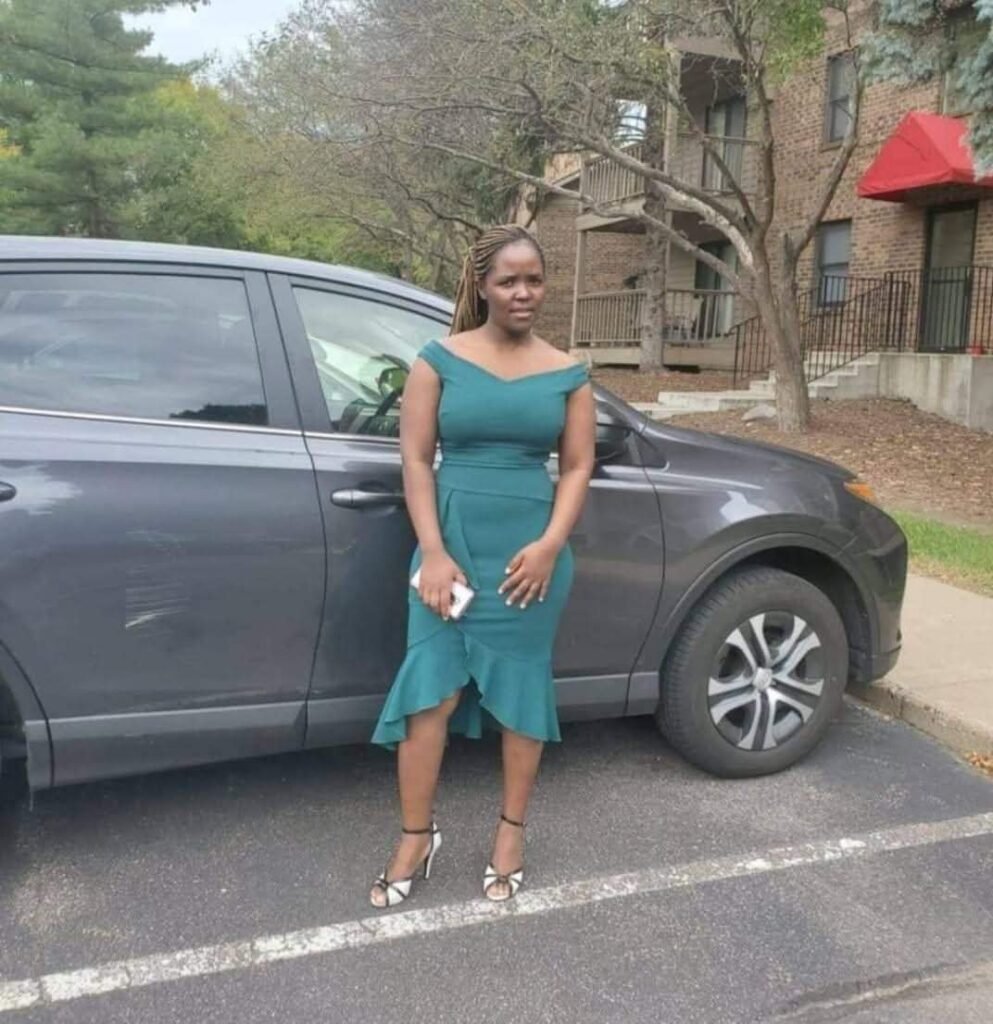
Angela Moraa’s journey serves as a poignant narrative that intertwines aspirations, deceit, and the complex nature of human relationships. A young woman yearning for a better life, Moraa’s primary dream revolves around obtaining a green card, which symbolizes freedom and opportunity in a new land. However, the path to realizing this dream is fraught with challenges that lead her to adopt a precarious double life. This narrative sheds light on the inherent dangers associated with living a dual existence, particularly when grounded in love, greed, and betrayal.
The quest for a green card compels her to navigate a landscape dotted with moral quandaries and emotional turmoil. What begins as a hopeful pursuit of the American Dream soon morphs into a saga marked by manipulation and compromised integrity. As she becomes entangled in relationships that blur the lines between genuine affection and ulterior motives, Moraa exemplifies how misplaced trust can lead to profound consequences. The allure of prosperity can cloud judgment, driving individuals to make decisions that ultimately undermine their core values.
This exploration of Moraa’s double life raises critical questions about identity and authenticity. It challenges the notion of what it entails to truly live one’s truth in a world that often rewards duplicity. The stark reality of her experience serves as a cautionary tale, reminding individuals of the perils that accompany the pursuit of personal ambitions at the expense of honesty. Misplaced trust in relationships often harbors the potential for betrayal, highlighting the emotional dangers that accompany the facade of a double life.
Through Angela Moraa’s story, readers are invited to reflect on the complexities of their own lives, the relationships they forge, and the societal pressures they confront in the pursuit of their dreams.
The American Dream
Moraa’s migration journey to Minnesota marked a significant turning point in her life, opening new doors and presenting a tapestry of opportunities intertwined with challenges. After receiving her green card approval, she envisioned a fresh start in America, fueled by the concept of the American Dream, which promised success, prosperity, and fulfillment. However, moving to Minnesota also meant navigating the complexities of her marriage to Dave, a man known for his genuine kindness and unwavering support. While Dave’s warm-hearted nature initially offered Moraa a sense of security, the relationship was layered with unspoken dynamics that slowly began to emerge.
As Moraa settled into her new environment, she felt the weight of societal expectations pressing down on her. The relentless pursuit of the American Dream not only came with aspirations of personal success but also brought forth an internal dilemma. Living in a new culture, where ambition often dictated one’s worth, she grappled with the need to balance her own dreams with the commitments of her marriage. Dave’s kindness, while comforting, became a source of conflict as Moraa began to question whether her ambitions aligned with the life she was building alongside him.
The pressure to achieve a better life intensifies as she confronts the societal norm that associates marital fidelity with personal sacrifice. Moraa’s yearning for self-actualization clashed with her perception of what being a good wife entailed, leading her to reflect on her true desires. The dichotomy of her American experience—between embracing her dreams and fulfilling her marital responsibilities—created a complex landscape of emotions. Ultimately, Moraa’s journey illustrates the intricate balance between individual aspirations and the realities of relational commitments, as she navigates the duality of her existence in this new land.
Love and Business in Kenya
Moraa’s narrative unfolds in the vibrant landscape of Kenya, where the intertwining of love and business often leads to complex dynamics. Central to her story is a secret relationship with a charismatic doctor, whose charm conceals a web of ambitions and entanglements. Their connection is not merely romantic; it is layered with the allure of financial promise and potential investments that he claims will yield significant returns. This unique blend of affection and entrepreneurial dreams enhances the stakes of their relationship.
Moraa frequently finds herself playing the role of a benefactor, supporting her boyfriend’s ventures financially while believing she is contributing to a shared vision. This involvement in his business pursuits creates a façade of partnership, camouflaging the complexities that lurk beneath the surface. The doctor crafts an enticing narrative about how their collaboration could transform both their lives—this potent mix of love and ambition makes it difficult for Moraa to see the full picture. As he convinces her of the viability and potential success of various ventures, she invests not only her money but also her trust and hope for a future built upon shared success.
However, the relationship’s intricacies further deepen as Moraa realizes that her financial support may not be translating into the romantic equity she envisioned. Instead of nurturing a balanced partnership, the undertones of greed complicate their love. The seductive promises made by her boyfriend create an illusion of stability and mutual gain, while the reality reveals a more self-serving agenda on his part. This dynamic raises critical questions about the nature of such relationships where love becomes entangled with business interests, ultimately revealing how ambition can sometimes overshadow genuine connection. In examining Moraa’s experiences, we are prompted to reflect on the leverage of love in financial commitments and how these interrelationships can sometimes lead to unexpected realities.
The Emotional Gamble
Moraa’s journey unfolds a complex web of emotional trust and financial investment, largely exemplified by her relationship with her boyfriend. Entrusting him with both her emotions and monetary funds, she finds herself caught in an emotional gamble, navigating the delicate balance between affection and caution. The convenience of communication platforms like WhatsApp deepens this dynamic, allowing her boyfriend to convey grand promises with ease, keeping Moraa continually engaged and hopeful. His confident assertions about a shared future often blur the line between genuine affection and manipulation.
Each message exchanged through WhatsApp is laced with hope, drawing Moraa further into his narrative. He assures her of a life together, often weaving tales of financial stability that hinge on her continued support. This dynamic has led Moraa to regularly send money, believing that her contributions will ultimately enhance their joint prospects. However, with each transaction, the stakes escalate, intertwining her emotional investment with her financial contributions, which raises questions about the authenticity of his intentions. It becomes increasingly challenging for her to differentiate between love and economic dependency.
The pivotal moment arrives when Moraa decides to return to Kenya for a surprise visit. This decision signifies much more than a simple reunion; it marks a critical juncture in their relationship, testing the foundations of their emotional and financial entanglement. As she prepares for this journey, Moraa is confronted with the implications of her investments and the reality of her boyfriend’s promises. The potential for joy is shadowed by the risk of betrayal, highlighting the emotional stakes tied to her relationship. The gamble she undertakes is not solely about love; it encompasses her hopes, fears, and the very trust she has placed in someone who may not reciprocate her feelings authentically.
The Shocking Truth
When Moraa first discovered the betrayal by her boyfriend, it felt as if her world had come crashing down around her. The image of the two of them, laughing and sharing moments of intimacy, haunted her mind as she recalled the love they had built together. On that fateful afternoon, she walked into a café, only to find him entrenched in conversation with another woman, their closeness apparent. It wasn’t merely a casual meeting; the romantic chemistry between them was unmistakable and painfully obvious.
Moraa’s heart raced, the shock immobilizing her for a moment. As she tried to process the situation, anger and disappointment surged within her. The feelings of betrayal were compounded by the realization that her financial investments, which she had entrusted to him under the pretense of a joint venture, were nothing but an elaborate ruse. She had been led to believe that they were building a future together, but in truth, her trust had been manipulated for his gain.
As she confronted him, the confrontation was not just about the other woman, but about the years of loyalty and love that had been thrown away. His nonchalant attitude towards her discovery intensified her emotional turmoil. Words like “I’m sorry” felt empty in the face of such deceit, and every explanation he offered fell flat against the undeniable betrayal she was forced to witness.
This moment marked a significant turning point for Moraa. It was no longer just about a romantic relationship; it was about her identity, her hard-earned money, and her trust in others. The harrowing feeling of being both emotionally and financially scammed left indelible scars, fostering a profound sense of loss that would take time to heal. The encounter not only shattered her heart but also ignited a fierce resolve within her to reclaim her life and independence.
Tragic Ending
The confrontation between Moraa and her boyfriend was fraught with tension, fueled by the emotions of love, greed, and betrayal. It was a night marked by rising tempers and unresolved issues, the culmination of a relationship that had begun to fray at the seams. Witnesses recall hearing loud arguments echoing from their apartment, filled with accusations and despair. This escalating conflict set the stage for what would become a tragic ending, leaving many to speculate on the exact nature of their demise.
In the wake of the incident, numerous theories emerged to explain the tragic events. Some suggest a murder-suicide scenario, where the despair stemming from financial issues and perceived betrayals drove Moraa’s boyfriend to take drastic measures. Others propose an accidental death spurred by a violent argument that spiraled out of control, leading to unintended consequences. The absence of clear evidence complicates these narratives, feeding into a broader dialogue on the nature of their relationship and the pressures they faced.
Further complicating the investigation are the personal choices made by both individuals in the lead-up to their tragic end. Both Moraa and her boyfriend had long wrestled with challenges, including financial strain and distrust, which manifested in their volatile interactions. The impact of these choices created a toxic environment that ultimately led to their doom. Friends and family members reflected on the visible changes in their behavior; Moraa’s increasing isolation and her boyfriend’s growing frustration left many feeling helpless, highlighting the importance of recognizing when relationships turn detrimental.
In conclusion, the tragic ending of Moraa and her boyfriend serves as a haunting reminder of how love can become twisted by greed and betrayal. Their story underlines the necessity of addressing underlying issues in relationships before they escalate beyond control. The speculative nature surrounding their deaths invites reflection on the darker aspects of human behavior and the tragic outcomes that can arise from unaddressed turmoil.
Key Lessons
The narrative of Moraa vividly illustrates several profound lessons regarding the repercussions of infidelity and the term “double life.” At the heart of this tale is a deep cautionary message about the severe consequences that often accompany the act of cheating. Moraa’s experience serves as a stark reminder that engaging in deception not only harms the individuals directly involved but can also have a ripple effect on the lives of those connected to them.
One crucial lesson gleaned from Moraa’s story is the importance of maintaining awareness when it comes to trust. Blind trust may seem appealing, but it can lead to devastating outcomes when placed in the wrong hands. Moraa’s journey exemplifies how misplaced trust can blind one to the reality of betrayal, ultimately paving the way for painful revelations. This scenario prompts a necessary examination of the relationships we cherish, advocating for healthy skepticism, especially when inconsistencies begin to surface.
Additionally, Moraa’s saga highlights the dangers of making emotional decisions without adequate foresight. Emotions can cloud judgment, often pushing individuals towards choices driven by fleeting desires rather than rational consideration. It becomes evident that greed, intertwined with the allure of a double life, can culminate in catastrophic consequences, not only for the deceivers but also for those whom they deceive. The blend of personal ambition and betrayal can shatter established bonds, leading to familial and relational breakdowns.
Ultimately, Moraa’s story serves as a sobering reminder of the lessons surrounding honesty, trust, and the perils associated with greed and deception. By reflecting on these insights, individuals may better navigate their own relationships, steering clear of the pitfalls that can arise from living a double life.
Broader Reflections
The dynamics of long-distance relationships often reveal intricate layers of human behavior shaped by societal pressures, culture, and individual expectations. Within this context, the juxtaposition of emotional connection and financial dependency becomes particularly notable. Many couples navigating geographical separation can find their bond tested not only by distance but also by the financial realities that accompany such arrangements. This phenomenon reflects a broader narrative about how love intertwines with practicality, often leading to unintended consequences and emotional turmoil.
As we explore the implications of these long-distance dynamics, it is essential to consider the cultural trends that influence them. For instance, one might jest about the emergence of the hypothetical ‘Kalahari Desert University,’ where young adults pursue degrees in love and emotional management while balancing financial challenges. This playful critique evokes a range of societal behaviors, illustrating how people often prioritize their financial stability over emotional well-being, subtly shaping their relationships. The existence of such imagined institutions is a testament to the complexities of modern love, suggesting that somehow, academia has influenced how young couples approach their romantic lives.
Moreover, societal norms often fuel the notion that economic success is imperative for romantic fulfillment. Many individuals feel pressured to attain a certain level of financial security before fully committing to a relationship, leading to a scenario where love is deferred in favor of stability. This financial dependency can engender unhealthy dynamics as one partner may come to rely heavily on the other’s income, potentially fostering resentment, jealousy, or even manipulation. Ultimately, understanding these broader reflections on relationships illuminates the delicate balance required in maintaining both emotional intimacy and financial independence.
Call to Action
The complexities of relationships can often lead individuals into difficult situations where emotions and financial interests intertwine. It is essential for readers to approach their connections with a sense of caution, particularly when they involve significant emotional investment or monetary contributions. In navigating personal relationships, awareness and prudence can serve as valuable tools for fostering healthier dynamics.
Honest communication between partners is paramount. Establishing a foundation of trust and integrity cultivates an environment where both individuals feel comfortable expressing their thoughts and concerns. Be open about your feelings, financial situations, and expectations to prevent misunderstandings that could lead to deeper issues down the line. When conversations about money arise, they should be approached delicately to avoid conflict. This approach ensures that both parties are aligned in their goals and helps in preventing manipulative behaviors that can lead to feelings of betrayal.
Recognizing red flags in a relationship is crucial. Behavioral signs such as reluctance to share personal information, inconsistent statements, or excessive secretiveness can indicate deeper issues. Similarly, a partner who frequently uses guilt or manipulation related to financial support may not have your best interests at heart. It is important to remain vigilant and prioritize your emotional and financial well-being. Prioritize discussions about commitment and financial responsibilities early in the relationship to set clear expectations and boundaries.
Ultimately, fostering integrity in personal connections involves mutual respect and accountability. By emphasizing these values, individuals can significantly improve the quality of their relationships, steering them towards positive outcomes while mitigating the risk of love being overshadowed by greed and betrayal.



